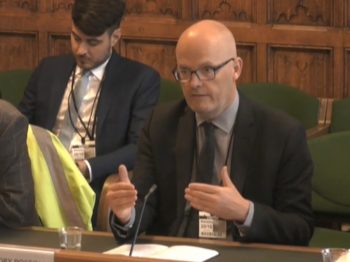Clear need for a national road pricing scheme in EV era, BVRLA tells MPs
The Government must start planning now for a national road pricing scheme to ensure a smooth transition and avoid a £40bn tax black hole in the switch to EVs, MPs have been told.

BVRLA director of corporate affairs Toby Poston told the Transport Select Committee it is imperative that road pricing is considered and trialled now to ensure a smooth transition into a new system
Speaking to the House of Commons Transport Select Committee yesterday (20 October) for its ongoing inquiry, the BVRLA said there was a clear need for a new national road pricing scheme to be developed as more and more zero-emission vehicles are seen on UK roads and both Vehicle Excise Duty (VED) and fuel duty plummet, leading to a £40bn shortfall.
Director of corporate affairs, Toby Poston said: “It is imperative that road pricing is considered and trialled now to ensure a smooth transition into a new system. Drivers and fleet operators need clarity on future taxation as they make the transition to zero-emission road transport.”
While there are no immediate plans for road pricing, it is on the Government’s agenda; according to a report in November 2020 in The Times, the Chancellor was mulling plans after being presented with a Treasury paper on a national road pricing scheme. And a month later, HM Treasury’s Net Zero Review Interim Report said the Government would need to consider how to offset the lost tax revenues from EVs and the Transport Select Committee opened its inquiry.
But any such move will be politically challenging, due to the fact that road pricing schemes remain deeply unpopular with drivers and seen as a ‘tax on wheels’, despite having been mooted as far back as 1964 in the so-called Smeed Report; a study into alternative methods of charging for road use.
The BVRLA has long been working with both the Treasury and wider transport stakeholders to look at how and when the tax system should adapt to the zero-emission transition. While it’s previously warned that getting the balance right on any new solution is tricky, it has set out some basic principles.
“Any new road pricing scheme must be easy to pay and have the simple objective of providing a revenue-neutral replacement for fuel duty and VED,” continued Poston. “It should be based on a simple ‘distance-driven’ model that considers vehicle weight, emissions and use case, with discounts given to shared mobility solutions – such as car clubs, rental cars, buses and taxis – to incentivise more sustainable travel choices.”
A recent poll by Venson found that while the majority (87%) of drivers agree that a solution to the tax shortfall must be found, there are differences of opinion over how it should be done. The most popular solution – chosen by 38% of respondents – was the introduction of a new Electric Vehicle tax that could see drivers of heavier vehicles, opposed to those with a greater engine size, paying heftier taxes. Only 22% were in favour of a blanket per-mile nationwide road pricing approach.
Alongside the BVRLA, the Transport Select Committee session also included representatives from RAC Foundation, the Renewable Energy Association and the Road Haulage Association.












